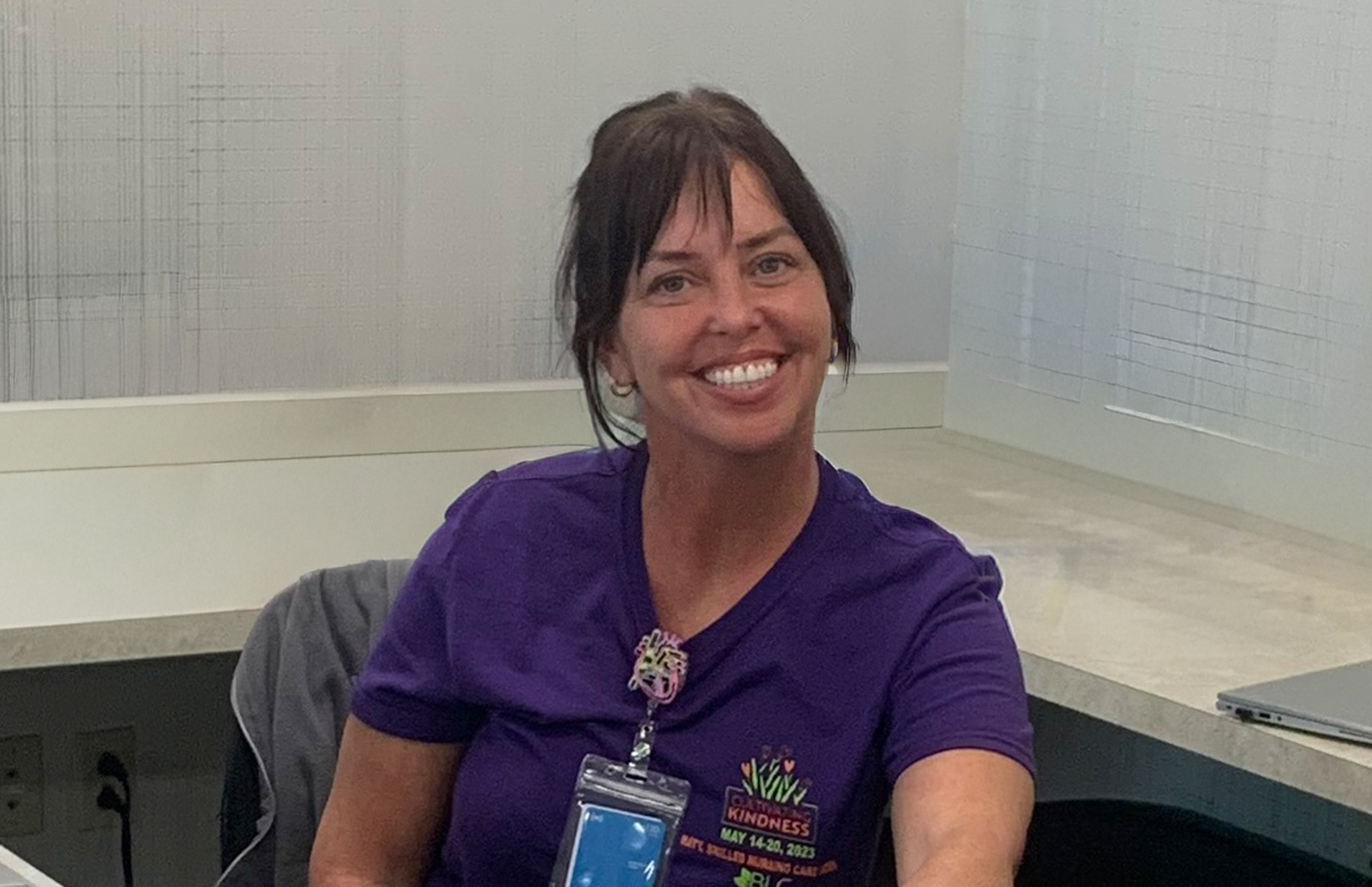Dana Conrad, LPN, will receive the 2025 Joan Anne McHugh Award for Excellence in Frontline Nurse Supervision at the LeadingAge Annual Meeting in Boston, Nov. 2-5. The award recognizes the vital role that frontline nurse supervisors play in the long-term services and supports (LTSS) workplace.
“I always knew I wanted to go into nursing,” says Conrad, who serves as a staff development nurse and human resources specialist at Baptist Life Communities (BLC) in Alexandria, KY. “I lost my dad when I was 12, and the hospital didn’t have a lot of resources. I knew then that I wanted to be an advocate for people who care for people.”
Coaching and Education
Conrad wears many hats at BLC. Primarily, she is responsible for providing education and training to members of the caregiving team at The Seasons@Alexandria, a BLC community that offers short-term skilled therapy and nursing care, long-term care, assisted living, memory care, and outpatient therapy to older adults.
Officially, Conrad’s role involves onboarding new staff as well as developing and implementing a competency-based education framework that “ensures each caregiver is equipped for success, both technically and emotionally,” says Reva Stroud, executive director/administrator at The Seasons@Alexandria. However, Conrad’s educational guidance has an even more significant impact when she collaborates with team members to provide direct care to residents.
“It’s a joy to be out there on the floor, interacting with staff and residents,” says Conrad, who believes that her caregiving role has been her most effective training method. “It keeps my skills sharp, and it shows that I wouldn’t ask (team members) to do anything that I wouldn’t do myself. It also helps me see firsthand the challenges that they’re facing, which makes the education I provide much more relevant.”
If Conrad sees a team member struggling with a task, she offers the necessary guidance immediately, in real-time. In this way, she turns “mistakes” into “educational moments.”
“I think staff appreciate the educational moments because they’re practical, quick, and directly related to the care they’re providing at that moment,” she says. “It doesn’t feel like extra work. It doesn’t feel like punishment. It feels like someone has their back. It makes them feel more confident, and it shows them that we’re invested in their success.”
Additionally, the personalized coaching method has proven effective. Stroud reports that it led to a 30% increase in retention over the past year.
Open Communication
To complement BLC’s formal and informal education initiatives, Conrad maintains an “Open Door” policy that encourages team members to discuss any topic with her at any time. She also holds team huddles that allow staff to check in regularly with each other and hosts monthly “State of Campus” meetings where she updates team members on “everything” happening at BLC.
“Communication is a big deal,” Conrad explains. “You can never, ever over-communicate.”
Open communication also plays a role in Conrad’s work as a liaison between frontline staff and BLC’s leadership team. Bringing the voices of the caregiving team to leadership meetings and transparently explaining leadership decisions to staff can be challenging, she admits. Still, she makes it work by “reminding everyone that we all share the same goals.”
Mentoring and Support
Conrad is on track to complete an RN program through the Kentucky Community and Technical College System next spring. She admits that working full-time while pursuing her RN can sometimes feel overwhelming. However, the challenge has made her more resourceful and determined—and it has inspired her to support others on the same journey. She readily shares information about programs that can help team members cover their educational costs and regularly offers advice for successfully balancing work and study. This kind of support isn’t always available to those seeking to enter or advance in the LTSS sector, she says.
“I can see how the younger generation might throw up their hands and say, ‘Forget this,’ because there’s no one really advocating for them,” she says. “At BLC, our message is different: ‘We’ll be there for anything you need. You’ve got this. And we’ve got you.’”
Conrad enthusiastically shares that supportive message with BLC caregivers because she receives the same support from her own team, which includes the administrator, director of nursing, HR manager, infection preventionist nurse, scheduler, and clinical coordinators at The Seasons@Alexandria.
“They all play a critical role in fostering education, supporting staff, and keeping things running smoothly, especially when I can’t always be present because of school,” she says. “It’s so important for every LTSS leader to belong to a team of leaders. When everyone knows how to succeed and supports one another, the whole team thrives.”
Commitment to the Profession
As if working full-time and attending school weren’t enough, Conrad has taken on a personal mission to reform the nursing home survey system. She recently drafted the “Dana May Act for Compassionate Care in Long-Term Care Facilities,” which directs state surveyors to work alongside LTSS staff and create what Conrad calls “a culture of collaboration and learning rather than one of fear and intimidation.”
Conrad hasn’t had much luck attracting interest in her proposal, but she’s not giving up. After finishing her RN program, she plans to continue advocating for an LTSS system “where compliance and compassion work hand in hand.”
For now, Conrad is doing her best to develop that system within Baptist Life Communities.
“Compliance is important,” she says. “But without compassion, compliance can’t build strong teams or quality care. I push for policies that reduce fear and foster learning. When staff feel safe, they thrive, and then the residents thrive.”
Learn about the McHugh Award and past recipients here, and about all LeadingAge awards and honors here.

 Shutdown Week Three: Impact of Ongoing Closure on Affordable Housing
Shutdown Week Three: Impact of Ongoing Closure on Affordable Housing HUD Streamlines Section 202 PRAC Budget Approvals
HUD Streamlines Section 202 PRAC Budget Approvals


